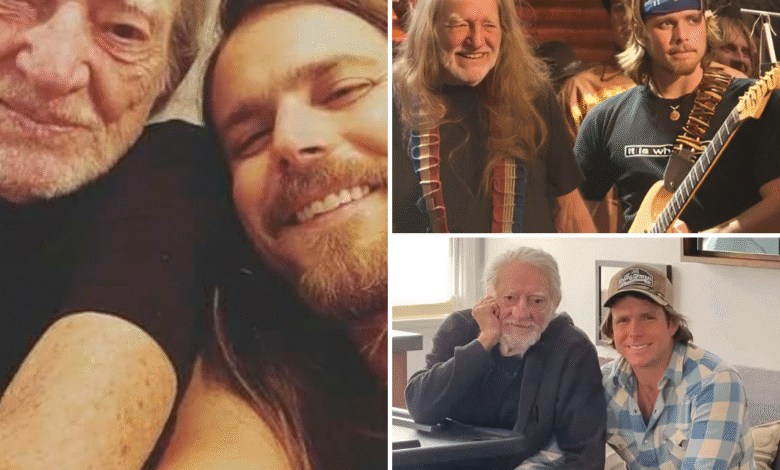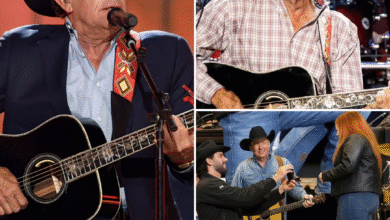Six decades on the road, Willie Nelson’s voice remains the heartbeat that keeps America’s soul singing loud and clear. ML

The Man Behind the Myth
Few artists have carried a nation’s soundtrack the way Willie Nelson has. From the dust-lined bars of Texas to the bright glare of sold-out arenas, Willie didn’t just sing country music — he shaped it.
But his influence reaches far beyond any single genre. For more than sixty years, Nelson’s songs have bridged boundaries between country, blues, gospel, and rock, blurring lines that others never dared to cross. His career has become a road map of American sound: honest, unhurried, and always headed toward truth.
Roots in Red Dirt

Born in Abbott, Texas, in 1933, Willie Hugh Nelson grew up surrounded by church hymns and radio static. His grandparents raised him through the Depression, teaching him both the power of faith and the dignity of hard work. By the age of ten, he was writing songs that sounded far older than he was — tunes that already carried the ache of miles not yet traveled.
When Nashville later told him his phrasing was “too strange” and his sound “too raw,” Willie didn’t change. He simply turned the bus around, back toward Texas, where his honesty fit the landscape. That stubborn faith in himself would soon spark the Outlaw Country Movement, giving artists permission to break free from formula and expectation.
Redefining Country — One Song at a Time
Throughout the 1970s, albums like Shotgun Willie, Red Headed Stranger, and Stardust reshaped what country music could be. His voice — nasal, cracked, and pure — became an instrument of truth. His guitar, a beat-up Martin nicknamed Trigger, told the rest of the story.
Songs like Blue Eyes Crying in the Rain, On the Road Again, and Always on My Mind captured everything country music is supposed to hold: heartbreak, humor, and hope. Yet even at his most vulnerable, Willie never sounded defeated. There’s a quiet defiance in his delivery — as if every lyric carries the promise that dawn will come again.
The Outlaw with a Cause

Willie Nelson’s legend isn’t only built on melodies; it’s built on compassion. In 1985, while most artists were chasing platinum records, he co-founded Farm Aid, a movement to keep America’s family farmers on their land. Nearly four decades later, Farm Aid has raised more than $85 million, proving that music can do more than entertain — it can rebuild communities.
He also launched the Luck Family Foundation, extending help to artists, small farmers, and disaster-struck families. True to form, he never made a show of it. “If you’ve got a little extra sunshine,” he once said, “you ought to spread it around.”
The Sound of a Nation
What makes Willie timeless is his ability to mirror America’s contradictions — rugged yet tender, lonely yet hopeful, rebellious yet deeply kind.
When he sings, highways stretch out like lifelines; diners, truck stops, and broken hearts all find their place in his verse. His music has a geography of its own — one that feels familiar even to those who’ve never been to Texas.
Portable speakers
He’s the troubadour of the in-between: between town and country, love and loss, yesterday and forever.
Trigger and the Truth
Trigger, his scarred 1969 Martin N-20 guitar, has traveled every mile with him — its worn wood a diary of decades. The holes near its bridge tell stories as clearly as the lyrics he’s written.
Nelson refuses to replace it. “It’s my second voice,” he says. “If I ever put it down, I might stop singing.”
That loyalty, both to his music and the people who listen, defines him. Where most legends retire into myth, Willie remains present — still touring, still recording, still reminding the world that music’s truest power lies in persistence.
Portable speakers
A Family of Sound

Willie’s legacy doesn’t stop with him. His children — especially Lukas Nelson, frontman of Promise of the Real — have carried the torch into a new generation, merging classic roots with modern edge. Lukas often says that his father never told him what to play, only how to feel.
That unspoken philosophy continues to ripple outward through artists across genres — from Kacey Musgraves and Chris Stapleton to Jack Johnson and Neil Young — all of whom trace part of their creative DNA back to Nelson’s fearless authenticity.
At 91, Willie shows no signs of slowing down. His schedule remains packed with festival dates, benefit shows, and studio sessions that blend country traditions with modern storytelling. Each performance carries the same humility as his earliest gigs — a man, a guitar, and a belief that honesty still sells tickets.
He walks on stage without fanfare, tips his hat, and lets the first chord do the talking.
No pyrotechnics. No choreography. Just truth in 4/4 time.
The Road Ahead
So much of Willie Nelson’s story has been written in motion. The open road isn’t just a setting in his songs — it’s his philosophy. Every town, every face, every night under unfamiliar stars adds another verse to the song he’s been writing all his life.
When people call him a legend, he smiles and shrugs. “I’m just trying to get to the next show,” he says. Yet in that modest reply lies something profound: the understanding that greatness isn’t a destination. It’s a journey that never quite ends.
A Song That Belongs to Everyone
For six decades, Willie Nelson has given America something rare — a mirror it can sing along to. His voice is woven into the country’s conscience, his songs carried down highways and across generations.
He’s proof that the real heart of music isn’t fame or charts or awards. It’s connection — between strangers, between eras, between every lonely soul who’s ever turned up the radio on a long drive home.





